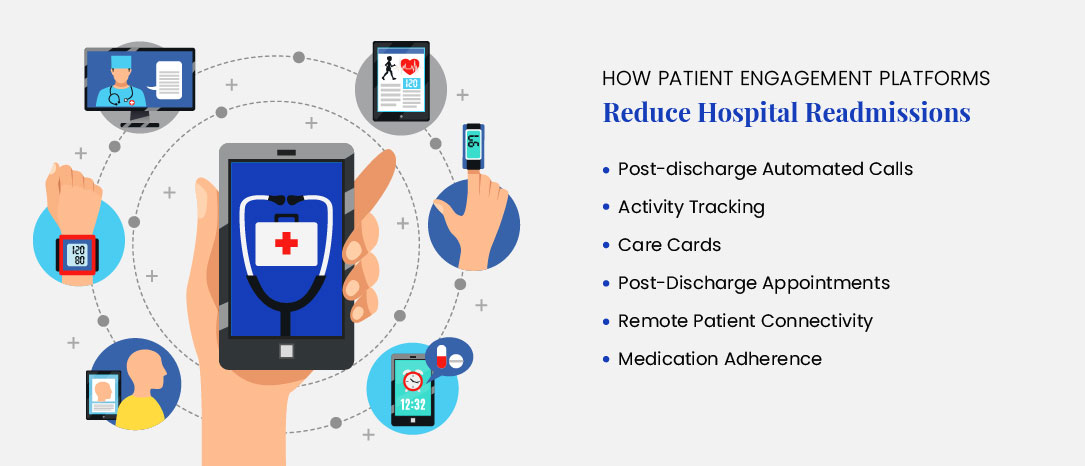Proven Digital Strategies
Proven Digital Strategies to Reduce Hospital Readmissions

Blog
Proven Digital Strategies to Reduce Hospital Readmissions

According to a CMS report, though the initiative adds cost to the federal healthcare funds, it can significantly reduce hospital readmission rates, which is indicative of the low quality of care.
A nnually billions of dollars are spent on hospital readmissions on account of avoidable occurrences in episodes of care. According to the Agency for Healthcare Research and Quality (AHRQ) report, readmissions within 30 days of discharge attribute to exorbitant Provider costs in excess of the U.S $41.3 billion, making episodes of care treatment amongst the most expensive. Furthermore, the annual hospital readmission cost of Medicare is about $26 billion, with $17 billion spent on preventable trips post-discharge.
The Centers for Medicare and Medicaid Services (CMS) has introduced the Hospital Readmissions Reduction Program to accelerate value-based care by linking reimbursements to quality of care at a hospital or practice—reducing reimbursements to hospitals with a high number of readmissions.
Considering the fact that hospital readmissions happen within 30 days of discharge, this accounts for an additional spending of about $17 billion by Medicare. According to a CMS report, though the initiative adds cost to the federal healthcare funds, it can significantly reduce hospital readmission rates, which is indicative of the low quality of care.
A majority of readmissions could be prevented through qualitative patient engagement with relevant care plans for patients discharged from hospital with instructions for post-operative care, remote patient monitoring and virtual care—that aids recovery.
SolvEdge’s patient engagement platform (RippleCARE) interfaces with electronic health records and newer data assets like genomic data—generating the much required actionable clinical outcomes. This also helps Providers leverage these actionable big data outcomes to reduce readmissions besides reducing costs and improving health outcomes.
Providers use an enormous amount of data to decide on how best to treat a patient. Parameters, to name a few, including current and past medical histories, lifestyles behavioral insights etc. These critical data points help determine outcomes and reduce preventable hospital readmission rates.
With billions of dollars being spent annually on preventable readmissions, reducing hospital readmission rates will require organizations to leverage the power of predictive algorithms and data sets to devise customized care plans for patients.
SolvEdge has partnered with hospitals and practices across the globe to reduce readmissions and has saved Providers in excess of $8.5 million through the implementation of RippleCARE’s patient engagement platform—which uses Artificial Intelligence (AI) and Natural Language Processing (NLP) to analyze large data sets to support Providers in clinical decision making.
Post-discharge from the Hospital, patients face the critical test of compliance on various factors, including medication adherence, exercise regimes and lifestyle changes among the others. While it could prove difficult for patients to follow these guidelines, it becomes increasingly necessary that care providers leverage patient management solutions to engage patients throughout the pre and postoperative care journeys.

It is estimated that nearly 20 percent of chronic disease patients under Medicare were readmitted to a hospital within 30 days because their condition worsened due to lack of engagement with their providers. Patient education and engagement via care plans is the key.
RippleCARE enables Healthcare Providers to stay engaged with patients from the comfort of their homes using IoT-enabled devices whilst remotely monitoring their health condition. Readmissions are preventable by consistent interface and exchange of Health information between Provides and patients. Personalized care plans post-discharge are monitored by care coordinators once diligently understood and complied with by patients.
A comprehensive Patient Engagement Platform can effectively handle the challenges of coordinated care delivery and holistic care throughout the clinical process and beyond—eliminating challenges like outdated and unstructured health data—in turn facilitating seamless patient collaboration.
Besides providers—health systems across geographies can support via health information exchanges (HIEs) in monitoring patients and improving care delivery and care management. Several hospitals in Illinois have utilized the platform to monitor and regulate processes—from registration to discharge and transfer of patients to their homes, which has led to a decrease in hospital readmissions by more than 10% over a period of two years.
This also combines cases of seamless coordination within the hospital environment—between caregivers and care coordinators, nurses and physicians all working closely and supported by the platform in offering patients a personalized care plan.
In conclusion, the changing regulations and the evolving healthcare landscape require Providers to leverage next-gen solutions including big data and analytics—to deliver preventive and value-based care to the lower length of stays, reduce healthcare costs, reduce readmissions and deliver optimized healthcare outcomes.
To learn more about how SolvEdge’s patient engagement platform can help reduce readmission rates and accelerate hospital and patient-reported outcomes, talk to our team.
Source: CMS – HRRP
From our humble beginnings as a healthcare start-up—to becoming a full-blown healthcare-exclusive digital transformation provider, our journey has been quite a remarkable one. Today, SolvEdge is a leading-edge Healthcare services and solutions provider—trusted by 450+ Hospitals, 3500+ Physicians and millions of patients across the globe.